
Clive Bull 1am - 4am
30 December 2020, 12:40 | Updated: 5 February 2021, 14:27
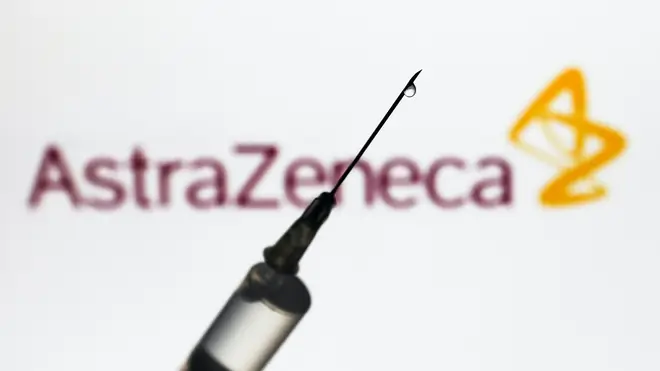
Covid-19 vaccines Oxford/AstraZeneca and the Pfizer/BioNtech were the first coronavirus jabs approved in the UK - but what are the differences and how do they compare?
The Oxford and AstraZeneca Covid-19 vaccine, described a “game changer”, was the second to be given the green light in the UK after the Pfizer/BioNTech jab was approved early in December.
But how are the two coronavirus vaccines different and what effect will this have in the UK's fight against the pandemic?
Here are the differences between the AstraZeneca and Pfizer immunisation and how they work:
READ MORE: Oxford coronavirus vaccine's biggest questions answered
The Government has secured 100 million doses of the Oxford vaccine, almost enough for the whole population.
The initial doses of the jab are due to be dispatched from Germany, with the majority then manufactured in the UK.
Health Secretary Matt Hancock has said 530,000 doses of the vaccine will be available from Monday, and millions more due by the beginning of February.
The UK has ordered 40 million doses of the Pfizer vaccine.
No matter which vaccine a person has, they will need two doses.

'We will be out of this by Spring,' Matt Hancock tells LBC
All of the people at the top of the priority list created by the Joint Committee on Vaccination and Immunisation (JCVI) have not yet been vaccinated.
Therefore vaccinators will continue to work their way through the list.
However, government regulators have said as many people as possible will receive the first dose as soon as possible, to ensure a high level of uptake.
Experts have determined the first dose of the Oxford vaccine is 70 per cent effective 22 days after it has been administered, and recommends the interval between the first and second should be between four and 12 weeks.
The initial plan for those having the Pfizer jab was to have the second dose 21 days after the first, but guidance has now been updated to day the secondary injection can be given up to 12 weeks after the first.
It is hoped more people in care homes will be reached with the rollout of the Oxford vaccine.
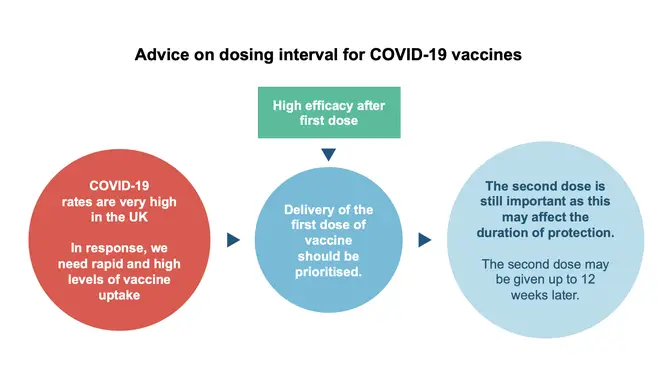
The Government has been clear that the efficacies for both vaccines are the same, they are both safe and offer a high-level of protection against Covid-19.
Experts say there are no head-to-head comparisons between the two, and the JCVI does not advise a preference between the two vaccines for any specific population.
The vaccine a person gets may rely on factors such as logistical considerations, how fast they can be deployed and how best to avoid wasting any vaccines.
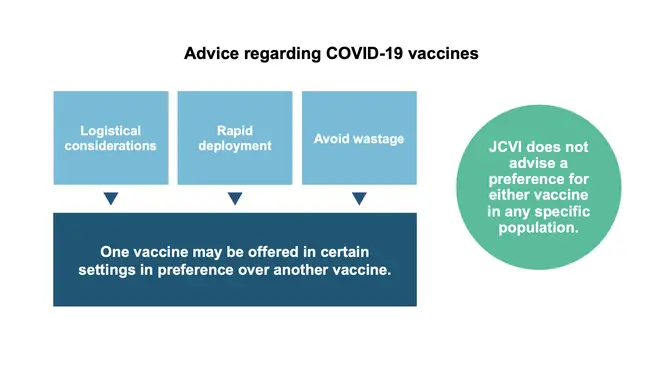
Researchers reported their trials do not suggest any significant safety concerns and the Government has declared both vaccines are safe.
The Government has also updated its guidance, which applies to both the Oxford and Pfizer jabs.
Pregnant women and women who are breastfeeding, who were previously not recommended to take the vaccine, are now permitted following a "benefit/risk discussion".
In terms of allergies, only people with a history of allergic reactions to any of the ingredients of the vaccines are now being told to not receive it; anyone else is permitted.
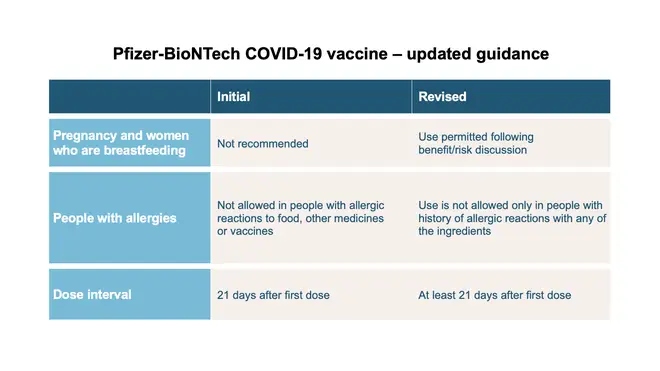
The Health Secretary has confirmed the first jabs will be administered on January 4.
A specific schedule from then is difficult to establish as batches need to be quality approved by the Medicines and Healthcare products Regulatory Agency (MHRA).
However the Oxford vaccine can be stored at fridge temperature for at least six months so it will be easier to roll out than the Pfizer one, which needs to be stored at –70C.
Mr Hancock said the “very effective” first dose will prevent serious illness while the second provides “longevity” in terms of protection.
READ MORE: Matt Hancock: 'We will be out of this by spring' after Oxford Covid vaccine approval
With cases of Covid-19 in the UK spiralling, high levels of vaccine uptake will be needed quickly which is why the delivery of the first dose is being prioritised.
Oxford data indicates the vaccine has 62.1 per cent efficacy when one full dose is given followed by another full dose, but when people were given a half dose followed by a full dose at least a month later, its efficacy rose to 90 per cent.
The combined analysis from both dosing regimes resulted in an average efficacy of 70.4 per cent.
The Pfizer vaccine has an efficacy of 95 per cent a week after the second dose.
Two full doses will be given to people receiving the Oxford vaccine since the half dose results did not form part of the full analysis.
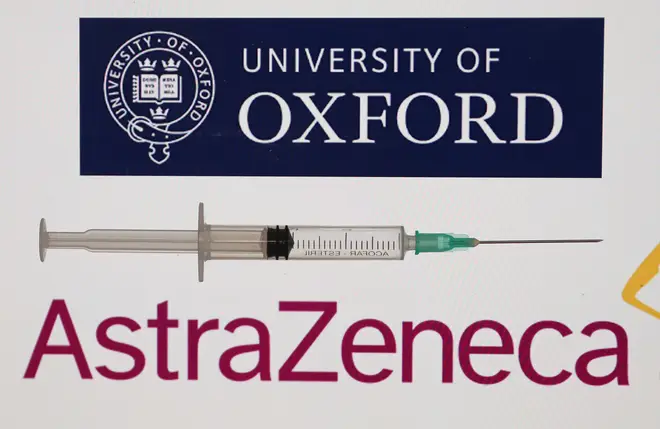
- 60 million doses of the Novavax vaccine
- 30 million doses from Janssen
- 60 million doses of a vaccine being developed by Valneva
- 60 million doses of protein adjuvant vaccine from GlaxoSmithKline (GSK) and Sanofi Pasteur
- Seven million doses of the jab on offer from Moderna in the US
As things stand the vaccines will be rolled out as and when they become available.
No announcement has been made on whether one might be given priority over another as they become ready on a mass scale.
People are not expected to be able to choose which jab they want to receive.